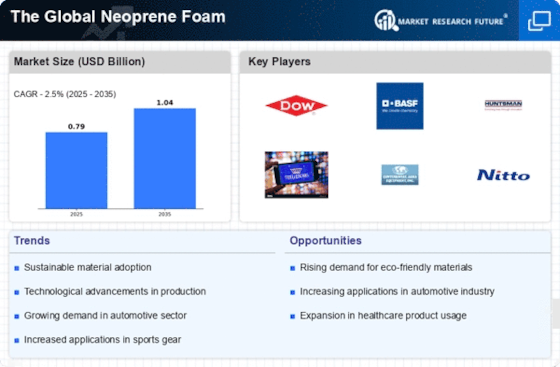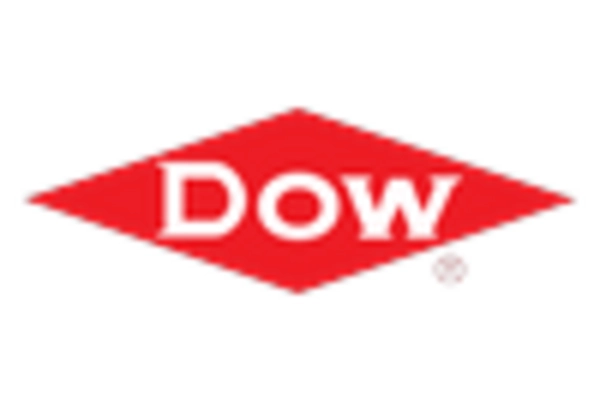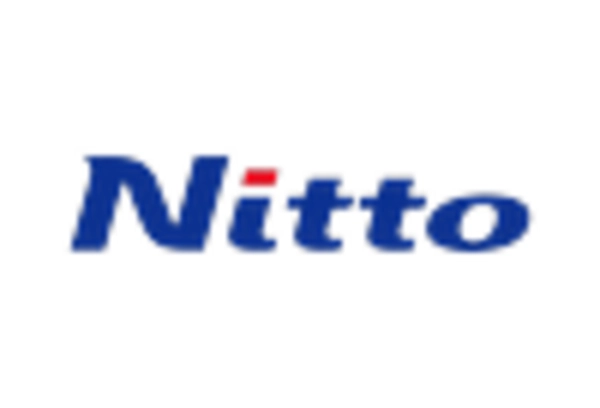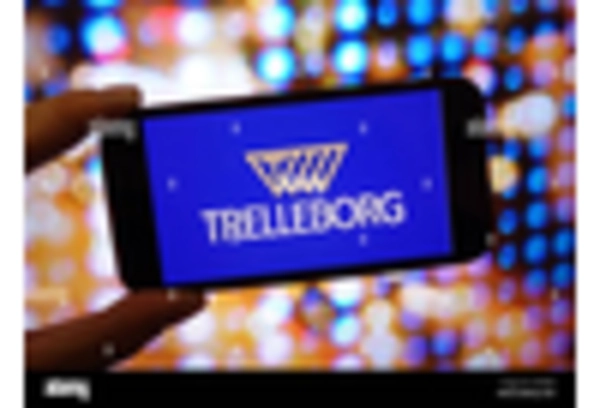-
EXECUTIVE SUMMARY
-
MARKET INTRODUCTION
-
Definition
-
Scope of the Study
- Research Objective
- Assumptions
- Limitations
-
RESEARCH METHODOLOGY
-
Overview
-
Data Mining
-
Secondary Research
-
Primary Research
- Primary Interviews
- Breakdown of Primary Respondents
-
and Information Gathering Process
-
Forecasting Model
-
Market Size Estimation
- Bottom-Up Approach
- Top-Down Approach
-
Data Triangulation
-
Validation
-
MARKET DYNAMICS
-
Overview
-
Drivers
-
Restraints
-
Opportunities
-
MARKET FACTOR ANALYSIS
-
Value Chain Analysis
-
Porter’s Five Forces Analysis
- Bargaining Power
- Threat of New Entrants
- Threat of Substitutes
- Intensity of Rivalry
-
of Suppliers
-
Bargaining Power of Buyers
-
COVID-19 Impact Analysis
- Market Impact Analysis
- Regional Impact
- Opportunity and
-
Threat Analysis
-
GLOBAL NEOPRENE FOAM MARKET,BY TYPE
-
Overview
-
Open Cell Foam
-
Closed Cell Foam
-
GLOBAL NEOPRENE FOAM MARKET,BY END-USE
-
Overview
-
Consumer Durables
-
Automotive
-
Chemicals
-
Construction
-
Pharmaceuticals
-
Food & Beverage
-
Transportation &
-
Logistics
-
Others
-
GLOBAL
-
NEOPRENE FOAM MARKET, BY REGION
-
Overview
-
North America
- US
- Italy
- Spain
- Rest of Europe
-
Canada
-
Europe
-
Germany
-
France
-
UK
-
Asia-Pacific
- China
- India
- Japan
- South Korea
- Australia
- Rest of Asia-Pacific
-
Rest of the World
- Middle East
- Africa
- Latin America
-
COMPETITIVE LANDSCAPE
-
Overview
-
Competitive Analysis
-
Market Share Analysis
-
Major Growth Strategy
-
in the Global Neoprene foam Market,
-
Competitive Benchmarking
-
Leading Players in Terms of Number of Developments
-
in the Global Neoprene foam Market,
-
Key developments and Growth Strategies
- New ProductLaunch/Service
- Joint Ventures
-
Deployment
-
Merger &Acquisitions
-
Major Players Financial Matrix
- Sales & Operating Income,2022
- Major Players
-
R&D Expenditure.2022
-
COMPANY PROFILES
-
Alanto Ltd.;
- Company Overview
- Financial Overview
- Products Offered
- Key Developments
- SWOT Analysis
- Key Strategies
-
DuPont;
- Company Overview
- Financial Overview
- Products Offered
- Key Developments
- SWOT Analysis
- Key Strategies
-
Denka Company Limited;
- Company Overview
- Financial Overview
- Products Offered
- Key Developments
- SWOT Analysis
- Key Strategies
-
Lanxess;
- Company Overview
- Financial Overview
- Products Offered
- Key Developments
- SWOT Analysis
- Key Strategies
-
Shanxi-Nairit Synthetic Rubber Co. Ltd;
- Company Overview
- Financial Overview
- Products Offered
- Key Developments
- SWOT Analysis
- Key Strategies
-
FOAMTECH Ltd.;
- Company Overview
- Financial Overview
- Products Offered
- Key Developments
- SWOT Analysis
- Key Strategies
-
Rubberlite, Inc.;
- Company Overview
- Financial Overview
- Products Offered
- Key Developments
- SWOT Analysis
- Key Strategies
-
Clark Foam Products;
- Company Overview
- Financial Overview
- Products Offered
- Key Developments
- SWOT Analysis
- Key Strategies
-
Sedo Chemicals
- Company Overview
- Financial Overview
- Products Offered
- Key Developments
- SWOT Analysis
- Key Strategies
-
Neoprene GmbH;
-
Company Overview
-
Financial Overview
-
Products Offered
-
Key Developments
-
SWOT Analysis
-
Key Strategies
-
Lauren Manufacturing
-
Company Overview
-
Financial Overview
-
Products Offered
-
Key Developments
-
SWOT Analysis
-
Key Strategies
-
Wisconsin Foam Products.;
-
Ridderflex.;
- Company Overview
- Financial Overview
- Products Offered
- Key Developments
- SWOT Analysis
- Key Strategies
-
Rubatex;
- Company Overview
- Financial Overview
- Products Offered
- Key Developments
- SWOT Analysis
- Key Strategies
-
Williams Products;
- Company Overview
- Financial Overview
- Products Offered
- Key Developments
- SWOT Analysis
- Key Strategies
-
GCP Industrial Products
- Company Overview
- Financial Overview
- Products Offered
- Key Developments
- SWOT Analysis
- Key Strategies
-
APPENDIX
-
References
-
Related Reports
-
LIST OF TABLES
-
GLOBAL NEOPRENE
-
FOAM MARKET, SYNOPSIS, 2018-2032
-
GLOBAL NEOPRENE FOAM MARKET, ESTIMATES &FORECAST, 2018-2032(USD
-
BILLION)
-
TABLE
-
GLOBAL NEOPRENE FOAM MARKET,BY TYPE, 2018-2032 (USD BILLION)
-
GLOBAL NEOPRENE FOAM
-
MARKET,BY END-USE, 2018-2032 (USD BILLION)
-
NORTH AMERICA: NEOPRENE FOAM MARKET,BY TYPE,
-
NORTH AMERICA: NEOPRENE FOAM MARKET,BY END-USE, 2018-2032 (USD
-
BILLION)
-
TABLE
-
US: NEOPRENE FOAM MARKET,BY TYPE, 2018-2032 (USD BILLION)
-
US: NEOPRENE FOAM MARKET,BY END-USE, 2018-2032
-
(USD BILLION)
-
TABLE
-
CANADA: NEOPRENE FOAM MARKET,BY TYPE, 2018-2032 (USD BILLION)
-
CANADA: NEOPRENE FOAM
-
MARKET,BY END-USE, 2018-2032 (USD BILLION)
-
EUROPE: NEOPRENE FOAM MARKET,BY TYPE, 2018-2032
-
(USD BILLION)
-
TABLE
-
EUROPE: NEOPRENE FOAM MARKET, BY END-USE, 2018-2032 (USD BILLION)
-
GERMANY: NEOPRENE FOAM
-
MARKET,BY TYPE,2018-2032 (USD BILLION)
-
GERMANY: NEOPRENE FOAM MARKET, BY END-USE, 2018-2032
-
(USD BILLION)
-
TABLE
-
FRANCE: NEOPRENE FOAM MARKET,BY TYPE, 2018-2032 (USD BILLION)
-
FRANCE: NEOPRENE FOAM
-
MARKET, BY END-USE, 2018-2032 (USD BILLION)
-
ITALY: NEOPRENE FOAM MARKET,BY TYPE, 2018-2032
-
(USD BILLION)
-
TABLE
-
ITALY: NEOPRENE FOAM MARKET, BY END-USE, 2018-2032 (USD BILLION)
-
SPAIN: NEOPRENE FOAM
-
MARKET,BY TYPE, 2018-2032 (USD BILLION)
-
SPAIN: NEOPRENE FOAM MARKET, BY END-USE, 2018-2032
-
(USD BILLION)
-
TABLE
-
UK: NEOPRENE FOAM MARKET,BY TYPE, 2018-2032 (USD BILLION)
-
UK: NEOPRENE FOAM MARKET, BY END-USE, 2018-2032
-
(USD BILLION)
-
TABLE
-
REST OF EUROPE: NEOPRENE FOAM MARKET,BY TYPE, 2018-2032 (USD BILLION)
-
REST OF EUROPE:
-
NEOPRENE FOAM MARKET, BY END-USE, 2018-2032 (USD BILLION)
-
ASIA-PACIFIC: NEOPRENE FOAM MARKET,BY TYPE,
-
ASIA-PACIFIC: NEOPRENE FOAM MARKET, BY END-USE, 2018-2032
-
(USD BILLION)
-
TABLE
-
JAPAN: NEOPRENE FOAM MARKET,BY TYPE, 2018-2032 (USD BILLION)
-
JAPAN: NEOPRENE FOAM
-
MARKET, BY END-USE, 2018-2032 (USD BILLION)
-
CHINA: NEOPRENE FOAM MARKET,BY TYPE, 2018-2032
-
(USD BILLION)
-
TABLE
-
CHINA: NEOPRENE FOAM MARKET, BY END-USE, 2018-2032 (USD BILLION)
-
INDIA: NEOPRENE FOAM
-
MARKET,BY TYPE, 2018-2032 (USD BILLION)
-
INDIA: NEOPRENE FOAM MARKET, BY END-USE, 2018-2032
-
(USD BILLION)
-
TABLE
-
AUSTRALIA: NEOPRENE FOAM MARKET,BY TYPE, 2018-2032 (USD BILLION)
-
AUSTRALIA: NEOPRENE
-
FOAM MARKET, BY END-USE, 2018-2032 (USD BILLION)
-
SOUTH KOREA: NEOPRENE FOAM MARKET,BY TYPE,
-
SOUTH KOREA: NEOPRENE FOAM MARKET, BY END-USE, 2018-2032 (USD
-
BILLION)
-
TABLE
-
REST OF ASIA-PACIFIC: NEOPRENE FOAM MARKET,BY TYPE, 2018-2032 (USD BILLION)
-
REST OF ASIA-PACIFIC:
-
NEOPRENE FOAM MARKET, BY END-USE, 2018-2032 (USD BILLION)
-
REST OF THE WORLD: NEOPRENE FOAM MARKET,BY
-
TYPE, 2018-2032 (USD BILLION)
-
REST OF THE WORLD: NEOPRENE FOAM MARKET, BY END-USE, 2018-2032
-
(USD BILLION)
-
TABLE
-
MIDDLE EAST: NEOPRENE FOAM MARKET,BY TYPE, 2018-2032 (USD BILLION)
-
MIDDLE EAST:
-
NEOPRENE FOAM MARKET, BY END-USE, 2018-2032 (USD BILLION)
-
AFRICA: NEOPRENE FOAM MARKET,BY TYPE, 2018-2032
-
(USD BILLION)
-
TABLE
-
AFRICA: NEOPRENE FOAM MARKET, BY END-USE, 2018-2032 (USD BILLION)
-
LATIN AMERICA: NEOPRENE
-
FOAM MARKET,BY TYPE, 2018-2032 (USD BILLION)
-
LATIN AMERICA: NEOPRENE FOAM MARKET, BY
-
END-USE, 2018-2032 (USD BILLION)
-
LIST OF FIGURES
-
RESEARCH PROCESS
-
MARKET STRUCTURE FOR THE GLOBAL NEOPRENE FOAM MARKET
-
MARKET DYNAMICS
-
FOR THE GLOBAL NEOPRENE FOAM MARKET
-
GLOBAL NEOPRENE FOAM MARKET, SHARE (%), BY TYPE,
-
FIGURE
-
GLOBAL NEOPRENE FOAM MARKET, SHARE (%), BY END-USE, 2022
-
GLOBAL NEOPRENE FOAM MARKET, SHARE (%),
-
BY REGION, 2022
-
FIGURE
-
NORTH AMERICA: NEOPRENE FOAM MARKET, SHARE (%), BY REGION, 2022
-
EUROPE: NEOPRENE FOAM
-
MARKET, SHARE (%), BY REGION, 2022
-
ASIA-PACIFIC: NEOPRENE FOAM MARKET, SHARE (%),
-
BY REGION, 2022
-
FIGURE
-
REST OF THE WORLD: NEOPRENE FOAM MARKET, SHARE (%), BY REGION, 2022
-
GLOBAL NEOPRENE
-
FOAM MARKET: COMPANY SHARE ANALYSIS, 2022 (%)
-
ALANTO LTD.: FINANCIAL OVERVIEW SNAPSHOT
-
ALANTO LTD.:
-
SWOT ANALYSIS
-
FIGURE
-
DUPONT:FINANCIAL OVERVIEW SNAPSHOT
-
DUPONT:SWOT ANALYSIS
-
DENKA COMPANY LIMITED:FINANCIAL OVERVIEW
-
SNAPSHOT
-
FIGURE
-
DENKA COMPANY LIMITED:SWOT ANALYSIS
-
LANXESS: FINANCIAL OVERVIEW SNAPSHOT
-
LANXESS:SWOT
-
ANALYSIS
-
FIGURE
-
SHANXI-NAIRIT SYNTHETIC RUBBER CO. LTD.:FINANCIAL OVERVIEW SNAPSHOT
-
SHANXI-NAIRIT
-
SYNTHETIC RUBBER CO. LTD.:SWOT ANALYSIS
-
FOAMTECH LTD.:FINANCIAL OVERVIEW SNAPSHOT
-
FOAMTECH LTD.:SWOT
-
ANALYSIS
-
FIGURE
-
RUBBERLITE, INC.: FINANCIAL OVERVIEW SNAPSHOT
-
RUBBERLITE, INC.: SWOT ANALYSIS
-
CLARK FOAM
-
PRODUCTS: FINANCIAL OVERVIEW SNAPSHOT
-
CLARK FOAM PRODUCTS: SWOT ANALYSIS
-
SEDO CHEMICALS NEOPRENE
-
GMBH: FINANCIAL OVERVIEW SNAPSHOT
-
SEDO CHEMICALS NEOPRENE GMBH: SWOT ANALYSIS
-
LAUREN MANUFACTURING:FINANCIAL
-
OVERVIEW SNAPSHOT
-
FIGURE
-
LAUREN MANUFACTURING:SWOT ANALYSIS
-
WISCONSIN FOAM PRODUCTS.:FINANCIAL OVERVIEW SNAPSHOT
-
WISCONSIN FOAM
-
PRODUCTS.:SWOT ANALYSIS
-
RIDDERFLEX.: FINANCIAL OVERVIEW SNAPSHOT
-
RIDDERFLEX.: SWOT ANALYSIS
-
RUBATEX: FINANCIAL
-
OVERVIEW SNAPSHOT
-
FIGURE
-
RUBATEX: SWOT ANALYSIS
-
WILLIAMS PRODUCTS: FINANCIAL OVERVIEW SNAPSHOT
-
WILLIAMS PRODUCTS:
-
SWOT ANALYSIS
-
FIGURE
-
GCP INDUSTRIAL PRODUCTS:FINANCIAL OVERVIEW SNAPSHOT
-
GCP INDUSTRIAL PRODUCTS:SWOT ANALYSIS


















Leave a Comment